aprilia SR 50 User Manual
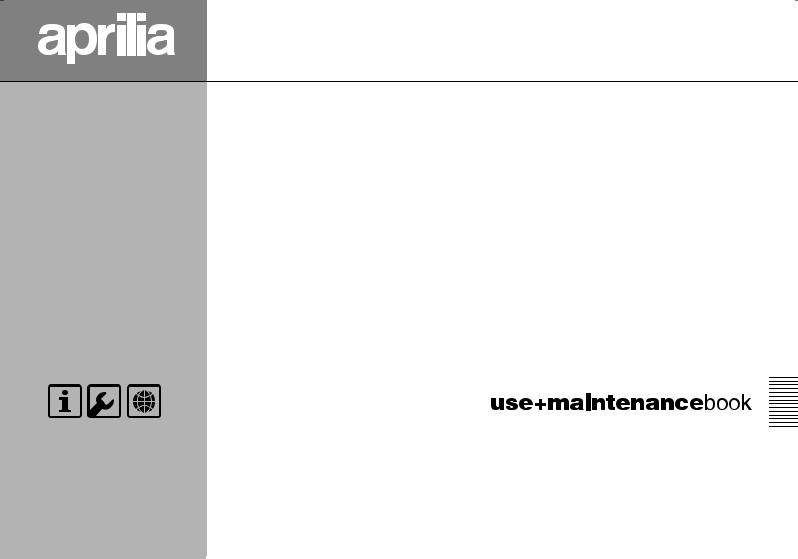
SR 50






 8202439
8202439
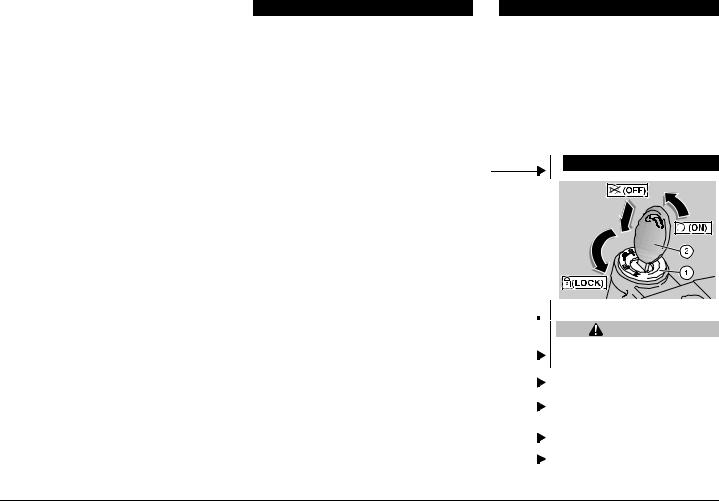
© 2005 Piaggio & C. S.p.A. - Noale (VE)
First edition: January 2005
Reprint: September 2006/A
Produced and printed by:
VALLEY FORGE DECA
Ravenna , Modena, Torino
DECA S.r.l.
Registered Main Office Via Vincenzo Giardini, 11 48022 Lugo (RA) - Italy - Tel. 0545-216611
Fax 0545-216610 www.vftis.com deca@vftis.spx.com
On behalf of:
Piaggio & C. S.p.A.
via G. Galilei, 1 - 30033 Noale (VE) - Italy Tel. +39 - (0)41 58 29 111
Fax +39 - (0)41 44 10 54 www.aprilia.com
FOREWORD
NOTE This manual is an important and integral part of your vehicle. Keep it with your vehicle at all times, even if your vehicle is resold.
aprilia has prepared this manual to supply you, the user, with correct and current information. However, since aprilia constantly improves the design of its vehicles, there may be slight discrepancies between your vehicle and the material given in this manual. If you have any questions about your vehicle, contact your Local aprilia Dealer, as he will have the very latest technical information available from the factory.
For tests and repairs not expressly described in this manual, to purchase aprilia genuine spare parts, accessories, and other products, and for help with specific problems, please contact your Local aprilia Dealer or service center. These professionals will be able to assist you promptly and accurately.
Thank you for choosing aprilia. Have a great ride!
This manual is copyrighted in all countries, and reproduction of any part thereof or the complete manual by any print or electronic means is strictly prohibited.
 INTRODUCTION
INTRODUCTION
This manual is divided into sections, chapters and paragraphs, by subject. The procedures described are laid out by single operation, and each operation is indicated by a ♦.
The numbered parts shown in the figures are identified in the text by the number in parentheses or the symbol representing them.
Example (the following text is generic and does not refer to this specific vehicle):
section |
MAIN INDEPENDENT CONTROLS |
|
chapter
 STEERING LOCK
STEERING LOCK
safety |
|
WARNING |
|
warning |
|
Never attempt to place the ignition |
|
|
|
|
switch in the locked “ ” (LOCK) |
paragraph |
|
position while the vehicle is moving. |
|
|
|
||
|
|
|
OPERATION |
operation |
|
||
|
To lock the steering: |
||
|
|
|
♦ Turn the handlebar completely to the |
|
|
|
|
|
|
|
|
|
|
|
left or to the right. |
position (2) |
|
♦ Turn the key (2) to position “ ”. |
|
|
|||
|
|
|
|
symbol “ ” |
|
||
|
♦ Press the key and turn it to position “ ”. |
||
|
|
|
|
|
|
|
|
|
|
|
♦ Remove the key. |
2 use and maintenance SR 50
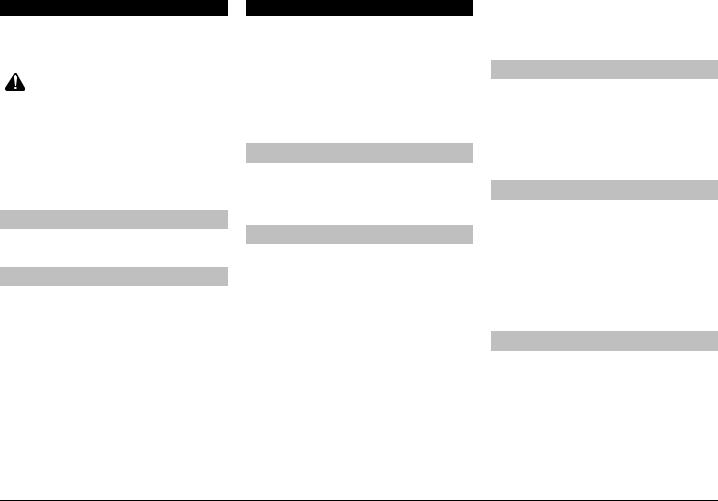
SAFETY WARNINGS
The following precautionary warnings are used throughout this manual in order to convey the following messages:
Safety Warning: When you see this symbol on the vehicle or in t h e m a n u a l , p a y p a r t i c u l a r
attention to the potential risk of personal injury or death.
Failure to comply with the instructions g i v e n i n t h e w a r n i n g m e s s a g e s preceded by this symbol may result in grave risk for your and other people’s safety and for the vehicle.
 WARNING
WARNING
Indicates a potential hazard which may result in serious injury or even death.
 WARNING
WARNING
Indicates a potential hazard which may result in personal injury or damage to the vehicle or other property.
NOTE The word “NOTE” in this manual precedes im portant information or instructions.
GENERAL SAFETY RULE
CARBON MONOXIDE
If it is necessary to run the engine in order to carry out maintenance operation, make sure that the area in which you are operating is properly ventilated. Never run the engine in enclosed spaces.
If it is necessary to work indoors, use an exhaust evacuation system.
 WARNING
WARNING
The exhaust fumes contain carbon monoxide, a poisonous gas that can cause loss of consciousness and even death.
 WARNING
WARNING
Carbon monoxide is both colorless and odorless, and cannot be detected by smell, vision, or any other sense. Avoid breathing exhaust fumes under any circumstances.
GASOLINE
Keep gasoline away from children. Gasoline is also poisonous. Never attempt to siphon gasoline using your mouth. Never allow gasoline to contact your skin. If you should accidentally spill gasoline on yourself, change your clothes immediately and wash the area upon which the gasoline was splashed thoroughly with hot water and soap. Should you accidentally swallow gasoline, do not induce vomiting. Drink large quantities of clear water or milk and immediately seek professional medical assistance. Should you
accidentally get gasoline get your eyes, flush with large quantities of cool, clear water and immediately seek professional medical assistance.
 WARNING
WARNING
Gasoline is extremely flammable and becomes explosive under certain conditions.
KEEP GASOLINE AWAY FROM CHILDREN.
HOT COMPONENTS
 WARNING
WARNING
The engine and all parts of the exhaust system, as well as the braking system, become very hot and remain hot for some time after the vehicle and the engine are stopped. Before handling any component of your vehicle after riding, make sure that it has cooled sufficiently to be safe to handle.
USED ENGINE OIL
 WARNING
WARNING
Use latex gloves for maintenance operations that require contact with used oil. Used engine oil may cause skin cancer if repeatedly left in contact with the skin for prolonged periods. Although this is unlikely unless you handle used oil on a daily basis, it is advisable to thoroughly wash your hands with soap and water after handling used oil.
KEEP OIL AWAY FROM CHILDREN.
use and maintenance SR 50 R |
3 |

BRAKE FLUID
 WARNING
WARNING
Brake fluid is extremely poisonous. Do not ever allow brake fluid to be ingested or swallowed . Should brake fluid accidentally be swallowed, drink large quantities of milk or clear water and immediately seek professional medical as sis tanc e . Br ak e f luid is highly destructive of skin and eye tissue. Should you accidentally spill brake fluid on yourself, remove the contaminated clothing, wash your body with soap and w a r m w a t e r i m m e d i a t e l y a n d immediately seek professional medical assistance. Should you accidentally splash brake fluid into your eyes, flush with a large quantity of cool, clear water and immediately seek professional medical assistance.
KEEP BRAKE FLUID AWAY FROM CHILDREN.
COOLANT
In certain conditions, the ethylene glycol contained in the engine coolant i s flammable: its flame is invisible, but you can be burned anyway.
 WARNING
WARNING
Avoid spilling the engine coolant on the exhaust system or on the engine components. They may be hot enough to cause the coolant to ignite and burn without a visible flame.
The coolant (ethylene glycol) can cause skin irritation and is poisonous if swallowed.
Coolant and coolant/water mixtures are sweet to the taste and brightly colored, therefore are highly attractive to pets and children. Take extra precautions to keep new and used coolant out of reach of children and animals.
K E E P C O O L A N T A W A Y F R O M CHILDREN.
Risk of burns.
Do not remove the radiator cap when the engine is hot. Wait until the engine has completely cooled down. The coolant is under pressure and may splash out and cause burns.
BATTERY HYDROGEN GAS AND ELECTROLYTE
 WARNING
WARNING
The battery gives off noxious and explosive gases; keep cigarettes, flames and sparks away from the battery. Provide adequate ventilation when operating or recharging the battery.
During recharging and use, make sure that the room is properly ventilated and avoid inhaling the gases released during the recharging.
The battery contains sulfuric acid (electrolyte). Contact with the skin or eyes may cause serious burns. Always wear protective clothing, rubber gloves, and tight fitting goggles or a face shield when working around the battery, especially when filling the battery with either water or electrolyte.
In case of contact with the skin, flush immediately with plenty of water. In case of contact with the eyes, flush with plenty of water for at least 15 minutes. I m m e d i a t e l y c o n s u l t a h e a l t h professional.
The electrolyte is poisonous.
I f t h e e l e c t r o l y t e i s a c c i d e n t a l l y swallowed, drink large quantities of water or milk and then milk of magnesia or vegetable oil. Immediately consult a health professional.
KEEP BATTERIES AND ELECTROLYTE AWAY FROM CHILDREN.
4 use and maintenance SR 50 R

WARNING - PRECAUTIONS - GENERAL ADVICE
Before starting the engine, read this manual carefully, and in particular the chapters “WARNINGS - PRECAUTIONS - GENERAL ADVICE” and “SAFE DRIVE” see p. 19.
Your safety and that of those around you depends not only on your skill as a rider, but also your knowledge about your vehicle and about riding safely. Therefore it is essential that you not operate your vehicle on public streets or highways until you have received instructions from a qualified safety organization such as the Motorcycle Safety Foundation, and are properly trained and licensed.
REPORTING OF DEFECTS THAT AFFECT SAFETY
If you believe that your vehicle has a defect which could cause a crash or could cause injury or death, you should immediately inform the National Highway Traffic Safety Administration (NHTSA) in addition to notifying aprilia. If NHTSA receives similar complaints, it may open an investigation, and if it finds that a safety defect exists in a group of vehicles, it may order a recall and remedy campaign. However, NHTSA cannot become involved in individual problems between you, your dealer, or aprilia. To contact NHTSA, you may either call the Auto Safety Hotline toll free at 1-800-424-9393 (or 366-0123 in the Washington, D.C. area) or write to: NHTSA, U.S. Department of Transportation, Washington, D.C. 20590.
You can also obtain other information about motor vehicle safety from the Hotline.
ROAD REGULATIONS
AND USE OF THE VEHICLE
Rules of the road vary from country to country. It is essential that you understand in advance the rules of the road of the country in which your vehicle will be used.
 WARNING
WARNING
This vehicle has been designed and produced for use only on paved roads. It is not designed to be used on even smooth graded dirt roads, or trails. It is not designed for off road competition, or for cross country riding. Do not use this vehicle on rough or unimproved surfaces, or in other off road areas. Failure to heed this warning could lead to an upset with subsequent injury and even death.
NOISE EMISSION WARRANTY
aprilia s.p.a. warrants that this exhaust system, at the time of sale, meets all applicable U.S. EPA Federal noise standards. This warranty extends to the first person who buys this exhaust system for purposes other than resale, and to all subsequent buyers.
Warranty claims should be directed to:
aprilia USA Inc.
140 E 45th Street, 17C
New York, NY 10012
Tel: 877. 277.4552 (877.Aprilia)
Fax: 001.212.380.4459
INFORMATION ON THE NOISE AND EXHAUST GAS EMISSION CONTROL SYSTEM
ORIGIN OF THE EMISSIONS
The combustion process produces carbon monoxide and hydrocarbons. The control of hydrocarbons is very important, because under certain conditions they react to exposure to sunlight and produce photochemical smog.
Carbon monoxide does not react in the same way, but it is toxic and poisonous. aprilia utilizes “lean” carburetor settings and other systems to reduce the production of carbon monoxide and hydrocarbons.
TAMPERING WARNING
Tampering with the noise control system is prohibited. Federal law prohibits the following acts or causing thereof:
a)The removal or rendering inoperative by any person other than for purposes of maintenance, repair, or replacement, of any device or element of design incorporated into any new vehicle for the purpose of noise control prior to its sale or delivery to the ultimate purchaser or while it is in use, or
b)The use of the vehicle after such device or element of design has been removed or rendered inoperative by any person.
use and maintenance SR 50 |
5 |
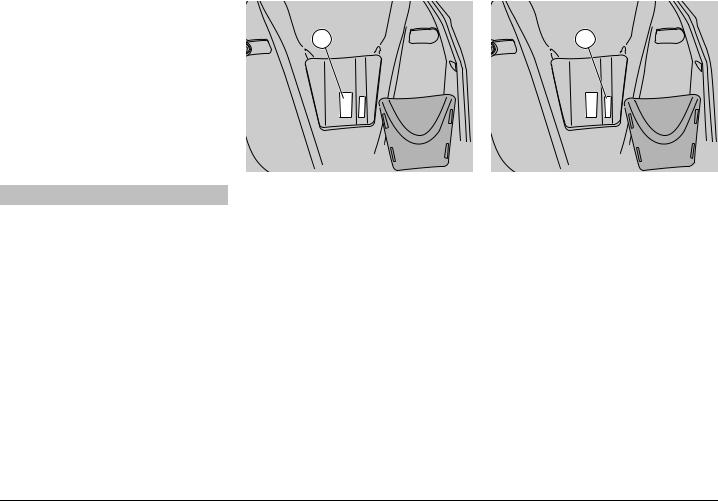
Among those acts presumed to constitute tampering are the acts listed below:
a)Removal of, or puncturing the muffler, baffles, header pipes or any other component which conducts exhaust gases.
b)Removal or puncturing of any part of the intake system.
c)Lack of proper maintenance.
d)Replacing any moving part of the vehicle, or parts of the exhaust or intake system, with parts other than those specified by the manufacturer.
 CAUTION
CAUTION
This product should be checked for repair or replacement if the vehicle noise has increased significantly through use. Otherwise, the owner may become subject to penalties under state and local ordinances.
PROBLEMS THAT MAY AFFECT THE VEHICLE EMISSIONS
If any of the following symptoms are observed, immediately have your vehicle inspected and repaired by your Local aprilia Dealer.
Symptoms:
–Difficult starting or stalling after starting.
–Irregular idle.
–Misfiring or backfiring during acceleration.
–After-burning (backfiring).
–Poor engine performance, degraded handling, or poor fuel economy.
B |
VEHICLE IDENTIFICATION NUMBER (V.I.N.) (FRAME NUMBER)
Every vehicle produced by aprilia receives a vehicle identification number (V.I.N.) stamped:
–on the steering head of the frame (A), as shown above;
and also:
–on the data plate (B) placed on the steering head.
A |
INFORMATION CONTAINED IN THE VEHICLE IDENTIFICATION NUMBER
Description of the vehicle identification number (V.I.N.), stamped on the steering head of the frame (A).
6 use and maintenance SR 50 R
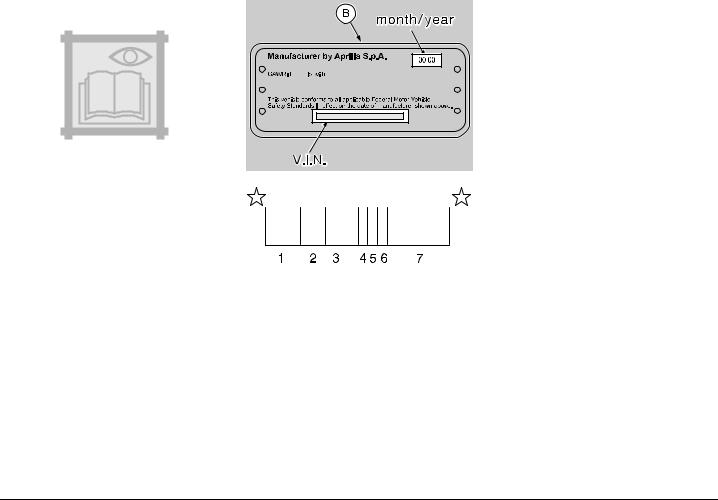
DIGIT MEANING
1)Manufacturer’s identification alphanumeric code.
2)Vehicle type.
3)Type of cycle, line, Engine type, and Engine Net Brake Horse Power.
4)#= Check digit number.
5)Model year.
6)Plant location
(N = NOALE-VE- , S = SCORZÉ -VE).
7)Sequential serial number.


 635 lbs.
635 lbs.
187 130/60 - 13" 53J tires E-13 x 3.50 - DOT-D rim, at 26.1 psi COLD 

 448 lb
448 lb
 130/60 - 13" 53J tires E-13 x 3.50 - DOT-D rim, at 31.9 psi COLD
130/60 - 13" 53J tires E-13 x 3.50 - DOT-D rim, at 31.9 psi COLD
MOTORCYCLE |
-VFC- |
|
ZD4RY***#4#000000
use and maintenance SR 50 R |
7 |
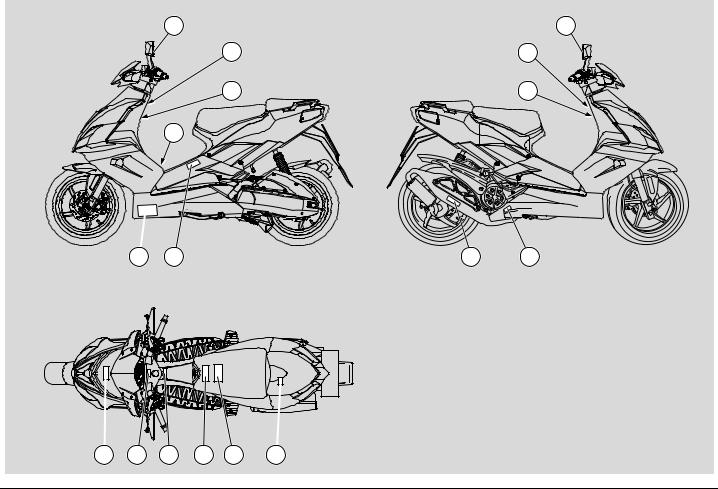
POSITION OF THE WARNING ADHESIVE LABELS
8 |
3 |
1 |
7 |
8 |
16 |
4 |
12 |
6 |
13 |
11 |
10 |
14 |
5 |
9 |
2 |
15 |
8 use and maintenance SR 50 R
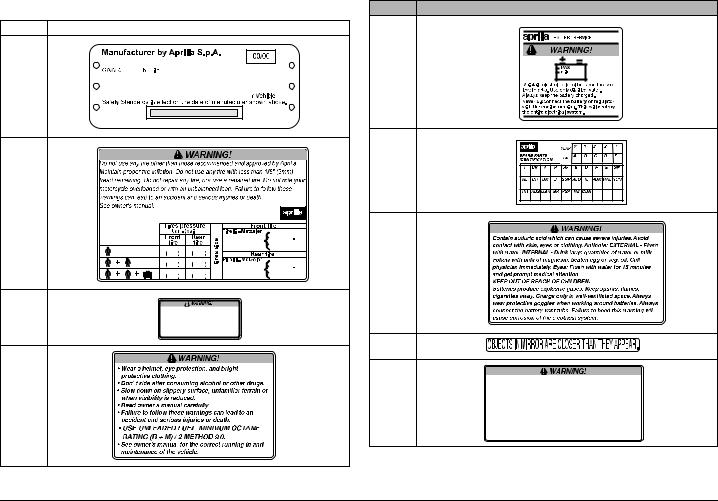
WARNING ADHESIVE LABELS CHART
Ref. |
Description |


 635 lb
635 lb
 187
187 
 130/60 - 13" 53J tires E-13 x 3.50 - DOT-D rim, at 26.1 psi COLD
130/60 - 13" 53J tires E-13 x 3.50 - DOT-D rim, at 26.1 psi COLD 


 417 lb
417 lb
 130/60 - 13" 53J tires
130/60 - 13" 53J tires
1 E-13 x 3.50 - DOT-D rim, at 31.9 psi COLD 














 U.S.
U.S.





MOTOR DRIVEN CYCLE |
-VFC- |
|
2 |
|
-VFC- |
|
|
|
|
Michelin |
|
|
|
|
Eurosawatech |
130/60 13 |
53J |
1.8 |
2.0 |
Cheng Shiin |
|
|
Maxxis |
|
|
||
26.1 |
29.0 |
|
|
|
1.8 |
2.2 |
Michelin |
|
|
26.1 |
31.9 |
130/60 13 |
53J |
|
1.8 |
2.2 |
Eurosawatech |
||
Cheng Shiin |
|
|
||
26.1 |
31.9 |
Maxxis |
|
|
THE CERTIFICATION LABEL IS 3 UNDER THE PLASTIC PANEL.
TO REMOVE THE PANEL
SEE OWNER'S MANUAL
4
Ref.
5
6
7
8
9
Description
Never install accessories or replacement parts not approved by Aprilia as original equipment. This can degrade the handling and safety of your motorcycle, and can cause an upset with subsequent accident and serious injury or even death. The stability and safety of any motorcycle is adversely affected by the addition of any load carrying accessory. See awner's manual.
Follow X
use and maintenance SR 50 R |
9 |
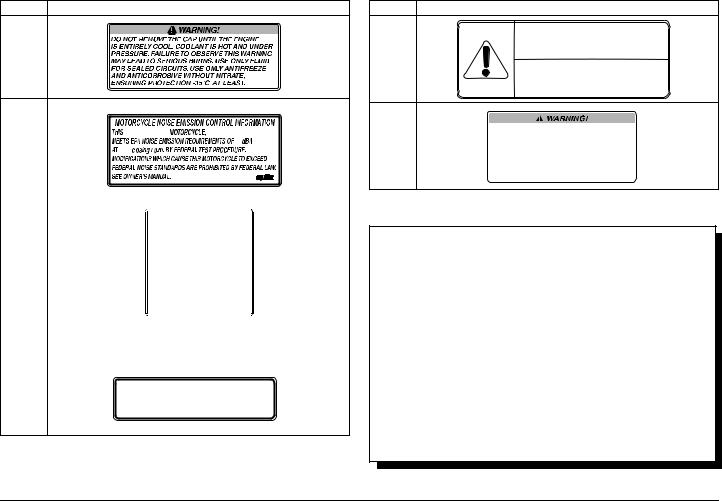
Ref. |
Description |
10
|
2006 ASP21E0049 |
B-1110 |
||||
11 |
|
|
70 |
|
|
|
4512 |
|
|
|
|
|
|
|
|
|
-VFC- |
|
|
|
|
|
|
|
|
||
|
|
|
|
|
|
|
|
|
|
|
|||
|
|
|
||||
|
|
VEHICLE EMISSION CONTROL INFORMATION -VFC- |
|
|||
ENGINE DISPLACEMENT: 49 cc ENGINE FAMILY: 6ASPC0.04VFC
THIS VEHICLE CONFORMS TO U.S. EPA AND CALIFORNIA
REGULATIONS APPLICABLE TO 2006 MODEL YEAR NEW MOTORCYCLES AND IS CERTIFIED TO 1.0 HC G/KM ENGINE FAMILY EXHAUST EMISSION STANDARD. ENGINE EXHAUST CONTROL SYSTEM: DFI
ENGINE TUNE UP SPECIFICATIONS 12 IDLE SPEED: 1600 ± 100 RPM
VALVE CLEARANCE: N.A.
|
|
SPARK PLUG: NGK ZMR7AP - NGK CR7E (or EKB) |
|||
|
|
NGK CR8E (or EKB) |
|
|
|
|
|
CHAMPION RG6YC (or YCA) |
|
|
|
|
|
FUEL: MINIMUM OCTANE RATING (M+R)/2 METHOD 90 |
|||
|
|
OIL: TWO STROKE OIL VISCOSITY SAE 40W (SYNTETIC) OR |
|||
|
|
30W (SEMISYNTHETIC). |
|
|
|
|
|
Aprilia S.p.A. |
|
|
|
|
|
Via G.Galilei 1 |
aprilia |
|
|
|
|
30033 Noale (VE) ITALY |
|
|
|
|
|
|
|
|
|
|
|
|
|
|
|
13 |
Muffler stamping. |
|
|
|
|
|
|
|
|
|
|
|
ATTENTION! STARTING PROCEDURE |
||||
14 |
Set on brakes and push START button. |
||||
|
|
See owner's manual. |
|||
Ref. |
Description |
 USARE BENZINA SENZA PIOMBO N.O. min. 95
USARE BENZINA SENZA PIOMBO N.O. min. 95
15
 USE UNLEADED FUEL RON min. 95
USE UNLEADED FUEL RON min. 95
Do not modify or tamper with this engine control unit in any way.
16 Modifications to this unit may reduce performance, and are prohibited by state and Federal laws. Any modification of this unit will immediately void the warranty.
PART 575.6, CONSUMER INFORMATION
aprilia World Service USA, Inc.
140 E 45th Street, 17C, New York, NY 10012
Reporting Safety Defects
If you believe that your vehicle has a defect which could cause a crash or could cause injury or death, you should immediately inform the National Highway Traffic Safety Administration (NHTSA) in addition to notifying aprilia World Service USA, Inc.
If NHTSA receives similar complaints, it may open an investigation, and if it finds that a safety defect exists in a group of vehicles, it may order a recall and remedy campaign. However, NHTSA cannot become involved in any individual problems between you, your dealer, or
aprilia World Service USA, Inc.
To contact NHTSA you may either call the Auto Safety Hotline toll-free at 1-888-327-4236 or write to:
NHTSA
U.S. DEPARTMENT of TRANSPORTATION
400 7th Street SW, (NVS-223) Washington, DC 20590
You can also obtain other information about motor vehicle safety from the Hotline.
10 use and maintenance SR 50 R

aprilia s.p.a. - EMISSION CONTROL SYSTEM WARRANTY STATEMENT
YOUR WARRANTY RIGHTS
AND OBLIGATIONS
The California Air Resources Board and aprilia s.p.a. (hereinafter “aprilia”) are pleased to explain the emission control system warranty on your 1999 and later motorcycle. In California new motor vehicles must be designed, built and equipped to meet the State’s stringent antismog standards. aprilia must warrant the e m i s s i o n c o n t r o l s y s t e m o n y o u r motorcycle for the periods of time listed below provided there has been no abuse, neglect or improper maintenance of your motorcycle.
Your emission control system may include parts such as the carburetor or fuel injection system, the ignition system, catalytic converter and engine computer. Also included may be hoses, belts, connectors and other emission-related assemblies.
Where a warrantable condition exists, aprilia will repair your motorcycle at no cost to you, including diagnosis, parts and labor.
MANUFACTURER’S EMISSIONS SYSTEM WARRANTY COVERAGE
Class I motorcycles (50 – 169 cm3): for a period of use of five (5) years or 12,000 kilometers (7,456 miles), whichever first occurs.
Class II motorcycles (170 – 279 cm3): for a period of use of five (5) years or 18,000 kilometers (11,185 miles), whichever first occurs.
Class III motorcycles (280 cm3 and larger): for a period of use of five (5) years or 30 , 0 0 0 k i l o m e t e r s ( 1 8, 6 4 1 m i l es ) , whichever first occurs.
If an emission-related part on your motorcycle is defective, the part will be repaired or replaced by aprilia. This is your emission control system DEFECTS WARRANTY.
OWNER’S WARRANTY
RESPONSIBILITIES
–As the motorcycle owner, you are responsible for the performance of the required maintenance listed in your owner’s manual. aprilia recommends that you retain all receipts covering maintenance on your motorcycle, but aprilia cannot deny warranty solely for the lack of receipts or for your failure to ensure the performance of all scheduled maintenance.
–You are responsible for presenting your motorcycle to an aprilia dealer as soon as a problem exists. The warranty repairs should be completed in a reasonable amount of time, not to exceed 30 days.
–As the motorcycle owner, you should be aware that aprilia may deny your warranty coverage if your motorcycle or a part has failed due to abuse, neglect, improper maintenance or unapproved modifications.
If you have any questions regarding your warranty rights and responsibilities, you should contact aprilia USA, Inc., 10933 Crabapple Road, Suite 100, Roswell, GA 3007, or the California Air Resources Board at P.O. Box 8001, 9528 Telstar Avenue, El Monte, CA 91731.
use and maintenance SR 50 R 11

aprilia s.p.a. - LIMITED WARRANTY ON EMISSION CONTROL SYSTEM
aprilia s.p.a., Via G. Galilei, 1, 30033 Noale (VE) Italy (hereinafter “aprilia”) warrants that each new 1999 and after aprilia motorcycle, that includes as standard equipment a headlight, taillight and stoplight, and is street legal:
A.is designed, built and equipped so as to conform at the time of initial retail purchase with all applicable regulations of the United States Environmental Protection Agency, and the California
Air Resources Board; and
B. is free from defects in material and w o r k m a n s hi p w h i c h c au s e s u c h motorcycle to fail to conform with applicable regulations of the United States Environmental Protection Agency or the California Air Resources Board for a period of use, depending on the engine displacement, of 6,000 k i l o m e t e r s ( 3 , 7 5 0 m i l e s ) , i f t h e motorcycle’s engine displacement is less than 50 cubic centimeters; of 12,000 kilometers (7,456 miles), if the motorcycle’s engine displacement is less than 170 cubic centimeters; of 18,000 kilometers (11,185 miles), if the motorcycle’s engine displacement is equal to or greater than 170 cubic centimeters but less than 280 cubic centimeters; or of 30,000 kilometers (18,641 miles), if the motorcycle’s engine displacement is 280 cubic centimeters or greater; or 5 (five) years
from the date of initial retail delivery, whichever first occurs.
I.COVERAGE. Warranty defects shall be remedied during customary business hour s at any authorized a pr i l i a motorcycle dealer located within the United States of America in compliance with the Clean Air Act and applicable regulations of the United States Environmental Protection Agency and the California Air Resources Board. Any part or parts replaced under this warranty shall become the property of aprilia.
In the State of California only, emission related warranted parts are specifically defined by the state’s Emission Warranty Parts List. These warranted parts are: carburetor and internal parts; intake manifold; fuel tank; fuel injection system; spark advance mechanism; crankcase breather; air cutoff valves; fuel tank cap for evaporative emission controlled vehicles; oil filler cap; pressure control valve; fuel/vapor separator; canister; igniters; breaker governors; ignition coils; ignition wires; ignition points; condensers, and spark plugs if failure occurs prior to the first scheduled replacement; and hoses, clamps, fittings and tubing used directly in these parts. Since emission related parts may vary from model to model, certain models may not contain all of these parts and certain models may contain functionally equivalent parts.
In the State of California only, Emission Control System emergency repairs, as pr ovided for in the California Administrative Code, may be performed by other than an authorized aprilia dealer. An emergency situation occurs when an authorized aprilia dealer is not reasonably available, a part is not available within 30 days, or a repair is not complete within 30 days. Any replacement part can be used in an emergency repair. aprilia will reimburse the owner for the expenses, including diagnosis, not to exceed aprilia’s suggested retail price for all warranted parts replaced and labor charges based on a p r il i a ’s recommended time allowance for the warranty repair and the geographically appropriate hourly labor rate. The owner may be required to keep receipts and failed parts in order to receive compensation.
II.LIMITATIONS. This Emission Control System warranty shall not cover any of the following:
A.Repair or replacement required as a result of
(1)accident,
(2)misuse,
(3)repairs improperly performed or replacements improperly installed,
(4)use of replacement parts or accessories not conforming to aprilia specifications which adversely affect performance and/or
12 use and maintenance SR 50 R

(5) use in competitive racing or related events.
B.Inspections, replacement of parts and other services and adjustments required for required maintenance.
C.Any motorcycle on which the odometer mileage has been changed so that actual mileage cannot be readily determined.
III. LIMITED LIABILITY
A.The liability of aprilia under this Emission Control System Warranty is limited solely to the remedying of defects in material or workmanship by an authorized aprilia motorcycle dealer at its place of business during customary business hours. This warranty does not cover inconvenience or loss of use of the motorcycle or transportation of the motorcycle to or from the aprilia dealer.
aprilia SHALL NOT BE LIABLE FOR ANY OTHER EXPENSES, LOSS OR DA MA GE , WHETHER DIRECT, INCIDENTAL, CONSEQUENTIAL OR EXE MPLARY ARISING I N CONNECTION WITH THE SALE OR USE OF OR INABILITY TO USE THE aprilia MOTORCYCLE FOR ANY PURPOSE. SOME STATES DO NOT ALLOW THE E XC LUSI ON O R LIMITATION OF ANY INCIDENTAL OR CONSEQUENTIAL DAMAGES, SO THE ABOVE LIMITATIONS MAY NOT APPLY TO YOU.
B.NO EXPRESS EMISSION CONTROL SYSTEM WARRANTY IS GIVEN BY aprilia EXCEPT AS SPECIFICALLY SET FORTH HEREIN. ANY EMISSION CONTROL SYSTEM WARRANTY IMPLIED BY LAW, INCLUDING ANY WARRANTY OF MERCHANTABILITY OR FITNESS FOR A PARTICULAR PURPOSE, IS LIMITED TO THE EXPRESS EMISSION CONTROL S YSTE M WARRANTY T ERMS STATED IN THIS WARRANTY. THE FOREGOING STATEMENTS OF WARRANTY ARE EXCLUSIVE AND IN LIEU OF ALL OTHER REMEDIES. SOME STATES DO NOT ALLOW LIMITATIONS ON HOW LONG AN IMPLIED WARRANTY LASTS SO THE ABOVE LIMITATIONS MAY NOT APPLY TO YOU.
C.No dealer is authorized to modify this aprilia Limited Emission Control System Warranty.
IV. LEGAL RIGHTS. THIS WARRANTY GIVE S Y OU SPE CIFI C LEGAL RIGHTS, AND YOU MAY ALSO HAVE OTHER RIGHTS WHICH VARY FROM STATE TO STATE.
V.THIS WARRANTY IS IN ADDITION TO THE aprilia LIMITED MOTORCYCLE WARRANTY.
VI. ADDITIONAL INFORMATION. Any replacement part that is equivalent in performance and durability may be used in the performance of any maintenance or repairs. However, aprilia is not liable for these parts. The owner is r esponsible for the perfor mance of all r equired maintenance. Such maintenance may be per formed at a service establishment or by any individual. The warranty period begins on the date the motorcycle is delivered to an ultimate purchaser.
aprilia s.p.a.
Via G. Galilei, 1 30033 Noale (VE) Italy
aprilia USA, Inc.
140 E 45th Street, 17C New York, NY 10012
use and maintenance SR 50 13
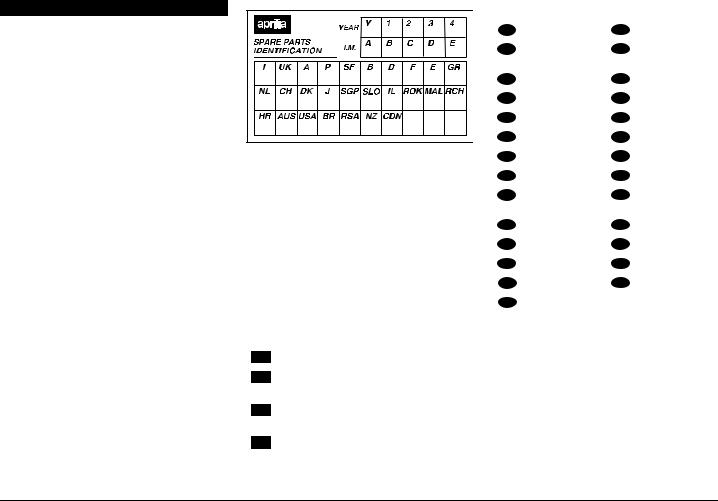
GENERAL INSTRUCTIONS
+The operations preceded by this symbol must be repeated also on
the opposite side of the vehicle.
If not expressly indicated otherwise, for the reassembly of the units repeat the disassembly operations in reverse order.
The terms “right” and “left” are referred to the rider seated on the vehicle in the normal riding position.
NOTE Soon after purchasing the vehicle, write down the identification data p r o v i d e d i n t h e S P A R E P A R T S IDENTIFICATION LABEL in the table below. This label is positioned on the left part of the frame; to be able to read it, remove the left inspection cover, see page 69 (REMOVING THE RIGHT AND LEFT INSPECTION COVERS).
These data indicate:
–YEAR = year of manufacture (Y, 1, 2, …);
–I.M. = modification code (A, B, C, …);
–COUNTRY CODE = country of homologation (I, UK, A, …).
and are to be supplied to the Local aprilia Dealer as reference data for the purchase of spare parts or specific accessories of the model you have acquired.
In this manual the various versions are indicated by the following symbols:
OPT optional
IE 361 electronic injection
Purejet engine
IE 50 electronic injection
Ditech engine
C 364 Carburettor
VERSION:
I |
Italy |
UK |
United |
|
Kingdom |
A |
Austria |
P |
Portugal |
SF |
Finland |
B |
Belgium |
D |
Germany |
F |
France |
E |
Spain |
GR |
Greece |
NL |
Holland |
CH |
Switzerland |
DK |
Denmark |
J |
Japan |
SGP
SLO
IL
ROK
MAL
RCH
HR
AUS
USA
BR
RSA
NZ
CDN
Singapore
Slovenia
Israel
South Korea
Malaysia
Chile
Croatia
Australia
United States
of America
Brazil
South Africa
New Zealand
Canada
14 use and maintenance SR 50 R

GENERAL INDEX |
|
FOREWORD................................................... |
2 |
INTRODUCTION............................................ |
2 |
SAFETY WARNINGS ..................................... |
3 |
GENERAL SAFETY RULE.............................. |
3 |
CARBON MONOXIDE............................................ |
3 |
HOT COMPONENTS ............................................. |
3 |
USED ENGINE OIL ................................................ |
3 |
BRAKE FLUID ........................................................ |
4 |
COOLANT .............................................................. |
4 |
BATTERY HYDROGEN GAS AND |
|
ELECTROLYTE...................................................... |
4 |
WARNING - PRECAUTIONS - GENERAL |
|
ADVICE ......................................................... |
5 |
REPORTING OF DEFECTS THAT AFFECT |
|
SAFETY.................................................................. |
5 |
ROAD REGULATIONS AND USE OF THE |
|
VEHICLE ................................................................ |
5 |
NOISE EMISSION WARRANTY ............................ |
5 |
INFORMATION ON THE NOISE AND EXHAUST |
|
GAS EMISSION CONTROL SYSTEM ................... |
5 |
TAMPERING WARNING........................................ |
5 |
PROBLEMS THAT MAY AFFECT THE VEHICLE |
|
EMISSIONS............................................................ |
6 |
VEHICLE IDENTIFICATION NUMBER (V.I.N.) |
|
(FRAME NUMBER) ................................................ |
6 |
INFORMATION CONTAINED IN THE VEHICLE |
|
IDENTIFICATION NUMBER .................................. |
6 |
DIGIT MEANING .................................................... |
7 |
POSITION OF THE WARNING ADHESIVE |
|
LABELS ................................................................. |
8 |
WARNING ADHESIVE LABELS CHART ............... |
9 |
APRILIA S.P.A. - EMISSION CONTROL |
|
SYSTEM WARRANTY STATEMENT .................. |
11 |
MANUFACTURER’S EMISSIONS |
|
SYSTEM WARRANTY COVERAGE.................... |
11 |
OWNER’S WARRANTY RESPONSIBILITIES ..... |
11 |
APRILIA S.P.A. - LIMITED WARRANTY ON |
|
EMISSION CONTROL SYSTEM.......................... |
12 |
GENERAL INSTRUCTIONS ......................... |
14 |
GENERAL INDEX ................................................ |
15 |
BASIC SAFETY RULES....................................... |
18 |
CLOTHING ........................................................... |
23 |
ACCESSORIES.................................................... |
24 |
LOAD .................................................................... |
24 |
ARRANGEMENT OF THE MAIN ELEMENTS26
LOCATION OF INSTRUMENTS/CONTROLS 28
INSTRUMENTS AND INDICATORS............. |
29 |
MULTIFUNCTION DIGITAL COMPUTER............ |
30 |
MULTIFUNCTION DIGITAL COMPUTER............ |
31 |
INSTRUMENTS AND INDICATORS TABLE........ |
33 |
MAIN INDEPENDENT CONTROLS .............. |
35 |
CONTROLS ON LEFT HANDLEBAR................... |
35 |
CONTROLS ON RIGHT HANDLEBAR ................ |
35 |
IGNITION SWITCH............................................... |
36 |
STEERING LOCK................................................. |
36 |
UNLOCKING/LOCKING THE SEAT..................... |
37 |
HELMET COMPARTMENT / GLOVE |
|
COMPARTMENT.................................................. |
37 |
GLOVE COMPARTMENT .................................... |
37 |
ANTITHEFT HOOK .............................................. |
38 |
BATTERY COMPARTMENT / TOOL KIT............. |
38 |
BAG HOOK........................................................... |
38 |
ACCESSORIES & ................................................ |
39 |
MAIN COMPONENTS .................................. |
40 |
FUEL..................................................................... |
40 |
LUBRICANTS ....................................................... |
41 |
TRANSMISSION FLUID ....................................... |
41 |
MIXER OIL............................................................ |
41 |
BRAKE FLUID - RECOMMENDATIONS.............. |
42 |
DISK BRAKES...................................................... |
43 |
COOLANT ............................................................ |
44 |
CHECKING AND TOPPING UP ........................... |
45 |
TIRES ................................................................... |
46 |
CATALYTIC MUFFLER ........................................ |
47 |
EXHAUST MUFFLER........................................... |
47 |
INSTRUCTIONS FOR USE .......................... |
48 |
PRE-RIDE CHECKS CHART ............................... |
48 |
STARTING............................................................ |
49 |
STARTING OFF AND RIDING ............................. |
51 |
RUNNING-IN ........................................................ |
53 |
STOPPING ........................................................... |
54 |
PARKING.............................................................. |
54 |
PLACING THE VEHICLE ON THE STAND.......... |
55 |
SUGGESTIONS TO PREVENT THEFT ............... |
55 |
MAINTENANCE........................................... |
56 |
SCHEDULED MAINTENANCE CHART ............... |
57 |
IDENTIFICATION DATA....................................... |
59 |
REAR WHEEL ...................................................... |
62 |
CHECKING THE BRAKE PADS FOR WEAR ...... |
63 |
REMOVING THE FRONT COVER ....................... |
64 |
REMOVING THE REAR BRAKE CALIPER.......... |
64 |
REMOVING THE EXHAUST MUFFLER ............. |
65 |
REMOVING THE EXHAUST MUFFLER ............ |
65 |
IDLING ADJUSTMENT ........................................ |
66 |
ADJUSTING THE THROTTLE CONTROL........... |
66 |
SPARK PLUG ....................................................... |
67 |
BATTERY ............................................................. |
68 |
PROLONGED INACTIVITY OF THE BATTERY .. |
68 |
REMOVING THE BATTERY................................. |
68 |
INSTALLING THE BATTERY ............................... |
69 |
CHECKING BATTERY FLUID LEVEL.................. |
69 |
CHARGING THE BATTERY................................. |
69 |
CHANGING THE FUSES ..................................... |
70 |
VERTICAL ADJUSTMENT OF THE HEADLIGHT |
|
BEAM.................................................................... |
71 |
BULBS .................................................................. |
71 |
CHANGING THE HEADLIGHT BULBS |
|
(LOW/HIGH BEAM) .............................................. |
71 |
CHANGING THE FRONT TURN INDICATOR |
|
BULBS .................................................................. |
72 |
CHANGING THE REAR TURN INDICATOR |
|
BULBS .................................................................. |
73 |
CHANGING THE TAIL LIGHT / STOP BULBS..... |
74 |
TRANSPORT............................................... |
75 |
DRAINING THE FUEL TANK ............................... |
75 |
CLEANING .................................................. |
76 |
PROLONGED PERIODS OF INACTIVITY ........... |
77 |
TECHNICAL DATA...................................... |
78 |
LUBRICANT CHART ............................................ |
81 |
WIRING DIAGRAM - SR 50 DITECH .................. |
82 |
WIRING DIAGRAM KEY - SR 50 DITECH .......... |
83 |
CABLE COLOUR.................................................. |
83 |
SCOOTER WIRING DIAGRAM - SR 50 |
|
PUREJET ............................................................. |
84 |
use and maintenance SR 50 R 15

WIRING DIAGRAM KEY - SR 50 PUREJET ...... |
85 |
CABLE COLOUR ................................................. |
85 |
SCOOTER WIRING DIAGRAM - SR 50 ............. |
86 |
SCOOTER WIRING DIAGRAM KEY - SR 50 ..... |
87 |
CABLE COLOUR ................................................. |
87 |
AUTHORIZED DEALERS AND SERVICE |
|
CENTERS ............................................................ |
88 |
16 use and maintenance SR 50 R
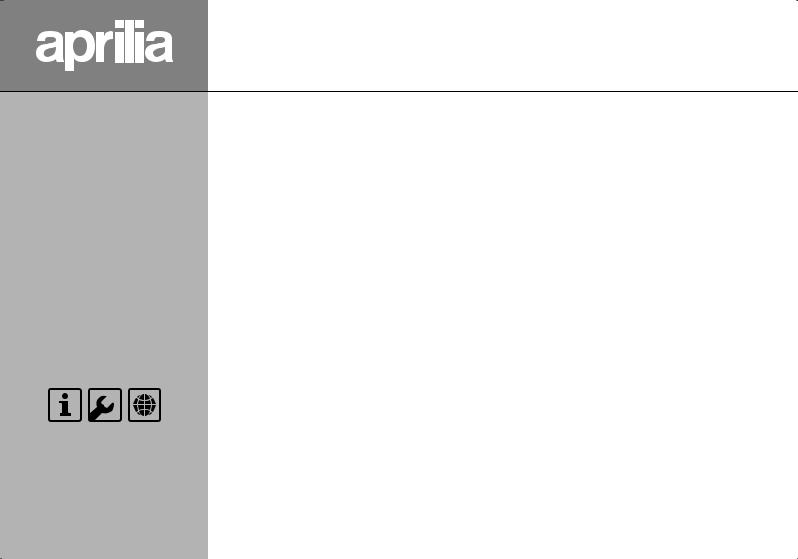
safe riding
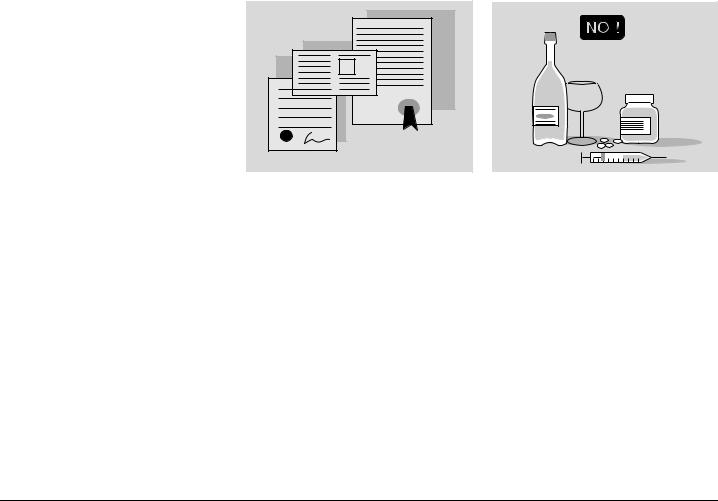
BASIC SAFETY RULES
The instructions given below cover normal operation of your vehicle and must be carefully observed. By following these rules you will enhance your own safety and the safety of those around you. You will also maximize the life and utility of your vehicle.
Two wheeled vehicles obviously do not provide some of the protection provided by automobiles, therefore it is essential that you wear appropriate protective clothing. Especially, never operate your vehicle without wearing your helmet, gloves, eye protection, a heavy jacket, sturdy footwear, and sturdy full length pants.
However, do not assume that even the best clothing and helmet will protect you in the event of an upset or a crash with another vehicle. At best, this gear provides some protection from scrapes and scratches, but very little, if any, impact protection.
Be sure that you meet all the requirements prescribed by local law, including driver’s license, minimum age, training, insurance, taxes, vehicle registration, license plate, etc.
When you first receive your vehicle, practice by riding in areas where there is little traffic. Do not attempt to ride in heavy traffic until you are thoroughly experienced and riding your vehicle has become second nature to you.
Although this vehicle is legal for operation on freeways and expressways, it is advisable to not ride on these high speed highways until you are thoroughly familiar with your vehicle, and have attained a high degree of skill in its operation.
A new vehicle must be carefully broken in, see p.54 (BREAKING-IN).
Before starting the engine, make sure that the brakes, clutch, transmission and throttle controls function properly and that the fuel and oil supply is adequate.
The exhaust system, brakes, and some other parts of the vehicle become very hot during operation. Do not touch any of these parts.
Some medicines or drugs, illegal or prescription, and alcohol significantly increase the risk of accidents. Do not ride while you are under the influence of a l c o h o l o r d r u g s , b e t h e y i l l i c i t o r prescription.
Make sure you are in good physical condition and not ill before riding your vehicle. Do not ride your vehicle when you are particularly tired or fatigued. Alcohol, drugs and fatigue are leading causes of vehicle accidents.
Many accidents are caused by the rider’s inexperience and lack of training. Do not ride your vehicle until you have received training from a recognized training organization such as the Motorcycle Safety Foundation. Remember that riding a two wheeled vehicle, though easy and fun, is quite different from driving a car. Do not assume that you can operate your vehicle safely just because you are a competent automobile driver.
Never lend your vehicle to others unless you are sure that they are competent and properly licensed vehicle operators.
18 use and maintenance SR 50 R
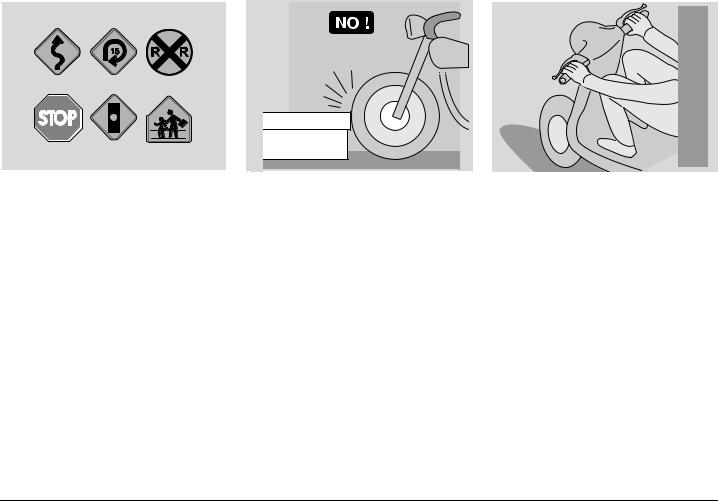
Observe all rules of the road. Particularly pay attention to all warning, regulatory and informational signs.
Avoid showing off (i.e., popping wheelies). Especially observe speed limits, remember that road conditions change with the weather and wet and icy pavements are particularly dangerous for vehicles, especially if you are riding too fast. Remember that automobile drivers have a hard time seeing two wheeled vehicles, so always give the automobile the right of way, even if it is legally yours.
Before changing lanes, look over your shoulder to make sure that the way is clear. Do not rely exclusively on the rearview mirror: you may miscalculate the distance and speed of a vehicle, or you may even not see it at all.
Avoid obstacles that could damage the vehicle or make you lose control.
Do not tailgate, do not attempt to increase your gas mileage by following in the slip stream of cars or trucks in front of you.
In case of accident motorcycles, scooters and mopeds do not provide the same d e g r e e o f p r o t e c t i o n e n s u r e d b y automobiles. The legs, in particular, are exposed the risk of being injured . However, the additional installation of leg guards may actually increase the risk of injuries and their seriousness in case of accident.
Do not install leg guards available on the market of spare parts and accessories. Non-compliance with these instructions may result in serious injuries or even death.
Always ride with both hands on the handlebars and feet on the footrests.
Never shift gear without using the clutch, if the vehicle is so equipped. Do not operate the shift lever or the other controls suddenly or abruptly. Such misuse can damage the internal components of the vehicle and consequently cause seizure, loss of control, accidents and serious injuries or even death.
Remain in the seat when you are riding. Do not stand up or attempt to stretch while you are riding your vehicle. If you need to rest, pull over to the side of the road when it can be safely done.
use and maintenance SR 50 R 19
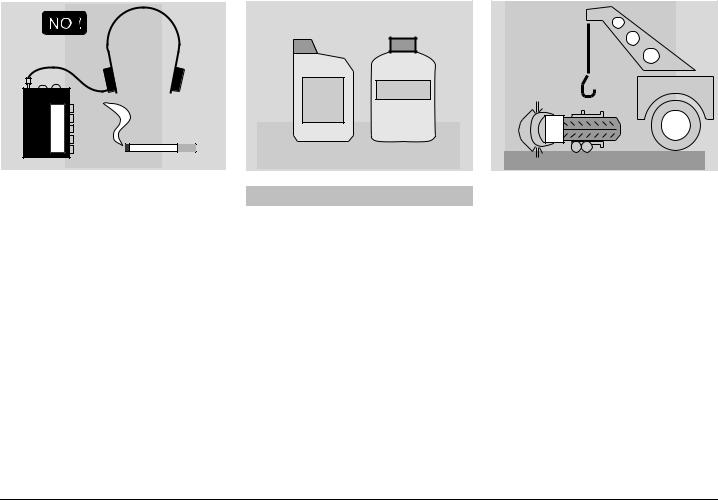
It is very important to your safety that you give full attention to the riding task. Watch what you are doing, do not allow yourself to be distracted by other cars, people or things on the roadside, etc. Never smoke, eat, drink, read, etc. while riding your vehicle. If you must consult a map, pull over when it can be done safely.
Use only the vehicle’s specific fuels and lubricants indicated in the “LUBRICANT CHART”; check the oil, fuel and coolant levels regularly.
If the throttle sticks open, it may cause a collision with another vehicle, or an upset.
If the throttle sticks, kill the engine with the engine stop switch located on the right handlebar.
Do not attempt to restart the engine until the throttle has been repaired and works perfectly. Failure to obey this warning can lead to a runaway with seriously injuries or even death.
COOLER |
OIL |
 WARNING
WARNING
In the event of a throttle sticking emergency, always kill the engine using the engine stop switch located near the throttle grip on the right handlebar. Never use your vehicle if the throttle does not automatically fully return to the idle position when the throttle grip is released. Contact your Local aprilia Dealer for repairs. Failure to heed this warning can lead to a serious accident and subsequent injury or even death.
If you and your vehicle are involved in an accident, insure that there has been no damage to the control levers, tubes, wires, braking system and other vital parts. If your vehicle is involved in an accident, take it immediately to your Local aprilia Dealer who has the equipment and knowledge to check for accidental damage which may compromise your safety.
Your aprilia dealer is ready and able to help you with any safety problems that you might have, but of course it is necessary for you to report any malfunctions to your mechanic in order for him to help you.
Do not use your vehicle if it is damaged. A damaged vehicle may become unstable or present other problems which can increase the risk of accident, and therefore of serious injury or even death.
20 use and maintenance SR 50 R
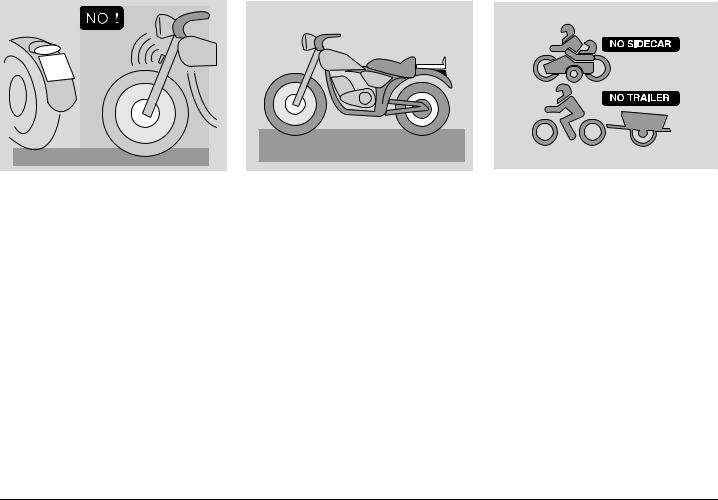
A12 |
345 |
Do not attempt to modify the position, angle or color of your license plate. Do not cover it with even a clear plastic covering. Do not modify any of the safety equipment of your vehicle, especially such safety related items as directional indicators, rear view mirrors, lights or horns.
Any modification to your vehicle will invalidate the warranty.
Do not modify your engine in an attempt to increase the horsepower. This can result in irreparable damage to the engine, as well as degradation of the performance and handling of the vehicle which could lead to an upset, and serious injury or even death.
ONLY ORIGINALS
Have your vehicle repaired only with original parts, and use only original aprilia or aprilia approved accessories. The use of aftermarket accessories and parts can seriously compromise the safety of your vehicle as well as its performance and serviceability. Any modification which affects performance or safety voids your warranty completely.
Tampering with the emissions or noise control systems on your vehicle is against the law, and can be punished by large fines.
In some jurisdictions, it can even lead to the confiscation of your vehicle.
This vehicle was not designed to be equipped with a sidecar or to be used to tow trailers or other vehicles.
aprilia does not manufacture sidecars or trailers and therefore cannot predict the effects of such accessories on the manoeuvrability or stability of the vehicle: it can only warn that such effects may be negative and that any damage to the vehicle components caused by the use of such accessories will not be covered by the warranty.
use and maintenance SR 50 R 21
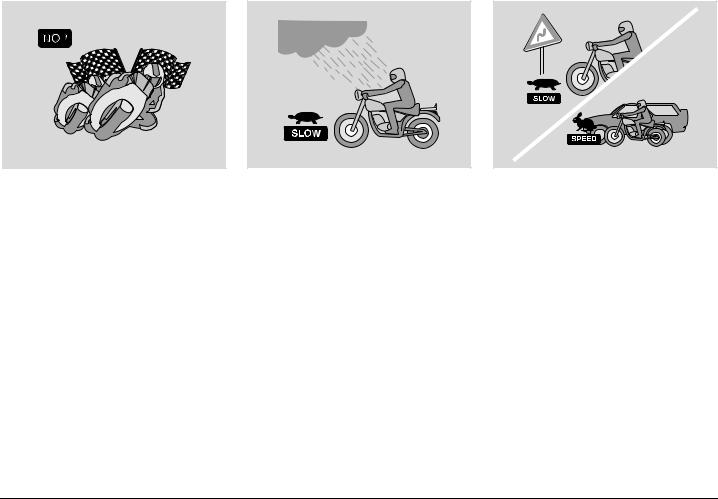
Never race other vehicles with your vehicle.
Brake with both the front and rear brakes. The use of one brake only for sudden braking may cause the vehicle to skid or make the rider lose control of the vehicle itself.
When riding down a steep hill, use the engine as a brake by selecting the same gear, or a lower gear, than you would use to climb the hill. Use front and rear brakes sparingly.
Always ride at the appropriate speed and avoid unnecessary hard acceleration. This not only is safer, but also reduces fuel consumption and increases the life of the vehicle.
If you must ride your vehicle in rainy weather, or on loose surfaces, remember that traction is greatly reduced. Under these conditions, all handling of the vehicle must be done gradually and smoothly. Sudden acceleration, braking or turning may make you lose control of your vehicle. When traction is reduced, accelerate and slow using your vehicle’s engine braking insofar as possible. Avoid rapid, harsh application of the brakes.
Gradually open and close the throttle, to avoid spinning or skidding the rear wheel.
On rough road surfaces, slow down and ride with particular care.
T r y t o a v o i d w i d e o p e n t h r o t t l e accelerations, unless they are necessary for such things as passing.
Don’t allow your engine to “lug,” that is, run at too low an rpm. Shift down to a lower gear. Also, don’t over-rev the engine. Observe the redline on the tachometer.
Remember that excessively aggressive cornering can cause your vehicle’s tires to lose sideways traction, which can result in an upset and serious injury or even death.
22 use and maintenance SR 50 R
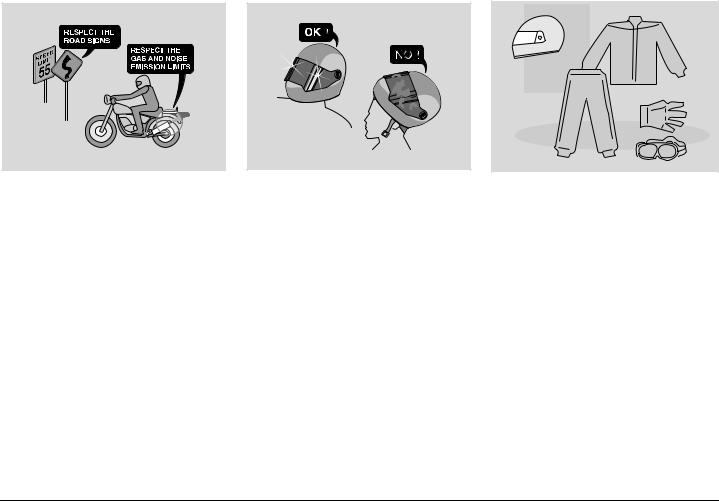
Always observe posted and statutory speed limits, but do not assume that you can ride as fast as the speed limit under all road conditions. Slowing down a little can greatly increase your safety under all road conditions.
Do not ride your vehicle off road.
Do not tamper with the muffler system or the emissions control system of your vehicle. This is not only bad for the environment, it can subject you to serious penalties.
CLOTHING
Before riding your vehicle, ensure that your riding gear is in good condition. To be effective, your helmet must fit properly, and the visor or other eye protection must be clean.
Both research and experience have shown that drivers of other vehicles often do not see vehicles or riders. In order to make yourself more conspicuous to these drivers, wear bright reflective clothing, such as a reflective vest, or clothing with reflective sections sewn into the jacket, pants and gloves. Be particular aware of approaching automobiles and trucks that might be trying to turn left in front of you. Many vehicle accidents are caused by an opposing automobile driver making a left turn without warning in front of the vehicle.
Inevitably, the driver will look right at you, and yet swear that they did not see you before they turned directly into your path. Ride alert!
Wear protective clothing, preferably in light and/or reflecting colors. In this way you will make yourself more visible to the other drivers, thus notably reducing the risk of being knocked down, and you will be more protected in case of fall.
Always wear your crash helmet. Many accidents are fatal because of injuries to the head.
This clothing should be very tight-fitting and fastened at the wrists and ankles. Strings, belts and ties should not be hanging loose; prevent these and other objects from interfering with driving by getting entangled with moving parts or driving mechanisms.
use and maintenance SR 50 R 23

Do not carry sharp objects in your pockets that could be dangerous in case of an upset, for example, pens or mechanical pencils, etc. Also, make sure that your passengers follow this recommendation.
ACCESSORIES
The owner of the vehicle is responsible for the choice, installation and use of any accessory.
T h e i n s t a l l a t i o n o f i n a p p r o p r i a t e accessories or the overloading of the vehicle may result in the instability of the vehicle itself and cause accidents with consequent risk of serious injuries or even death. Windshields could be particularly dangerous, as they can break and injure or cut the rider in case of accident. In case of doubts with regard to any accessory you would like to install or any load you would like to carry, previously consult your Local aprilia Dealer.
Avoid installing accessories that cover horns or lights or that could impair their functions, limit the suspension stroke and the steering angle, hamper the operation of the controls and reduce the distance from the ground and the angle of inclination in turns.
Avoid using accessories that hamper access to the controls, since this can p r o l o n g r e a c t i o n t i m e s d u r i n g a n emergency.
Fairings and windshields installed on the vehicle may produce aerodynamic forces that will affect the stability of the vehicle during use, especially at high speeds.
Make sure that anything you carry on your vehicle is securely attached, and cannot come lose and jam the wheels, forks, etc. Do not install any electrical accessories, and do not modify the electrical system of your vehicle. Anything that could cause an electrical overload or other fault could cause the vehicle to suddenly stop, the lights to dim or quit, or the horn and other safety accessories not to work. Use only genuine aprilia accessories.
LOAD
Do not overload your vehicle. Attach luggage or packages as close as possible to the center of your vehicle and distribute the load from side to side as evenly as possible, to keep imbalance to a minimum. Remember that loads tend to loosen with riding, so frequently check the security of your load.
24 use and maintenance SR 50 R

KG! |
Do not hang anything from your vehicle handlebars, fenders, or forks, because this will upset the handling of your vehicle, and could prevent you from avoiding an accident. Failure to heed this warning can lead to an upset with subsequent serious injury or even death.
Do not ride with your crash helmet hung from the strap because it could easily foul the wheels, fenders, or forks, causing an upset and subsequent serious injury or even death.
Carry a passenger only if your vehicle is equipped with passenger footpegs, handgrips for the passenger to hold on to, and a passenger saddle.
When carrying a passenger, remember that your vehicle’s handling is degraded, that the brakes are less efficient, and the center of gravity is higher and further to the rear.
This makes it more likely that the front wheel will come up off the ground, especially on acceleration. Therefore, you should avoid hard acceleration and hard braking. Many accidents are caused by inexperienced riders carrying passengers. Remember that allowance must be made for the extra weight of the passenger for all driving maneuvers.
Avoid abrupt and excessive acceleration. Always slow down in time and calculate l o n g e r s t o p p i n g a n d m a n e u v e r i n g distances. Non-compliance with these instructions may lead to the overturning of the vehicle or to other accidents with consequent serious injuries or even death.
Never carry loosely packaged items, make sure that everything that you carry on your vehicle is carefully secured.
Do not carry packages which protrude from the luggage rack or which cover any of the signal lights, the headlight, or the horn.
Never carry animals or children on the glove compartment or on the luggage rack.
Never exceed the labeled maximum load for each saddlebag.
Overloading your vehicle seriously reduces its stability and maneuverability and can lead to an upset with subsequent serious injury or death.
use and maintenance SR 50 R 25
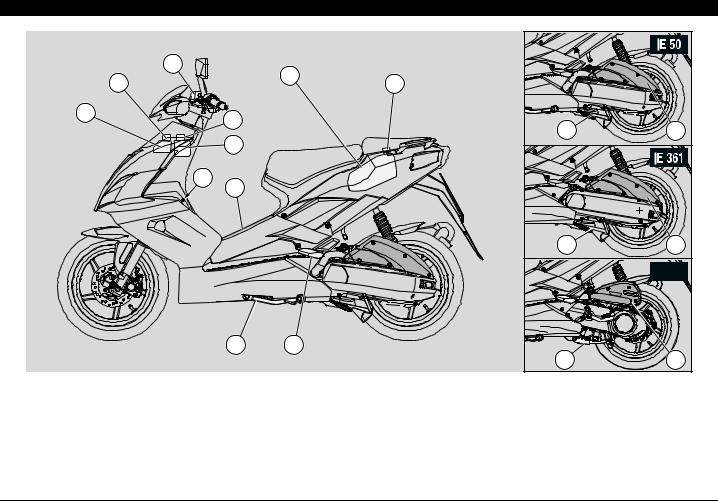
ARRANGEMENT OF THE MAIN ELEMENTS
|
3 |
8 |
|
|
2 |
|
|
|
9 |
|
|
1 |
4 |
|
|
|
11 |
10 |
|
|
5 |
||
|
|
|
|
|
6 |
|
|
|
7 |
|
|
|
|
11 |
10 |
|
|
|
C 364 |
|
13 |
12 |
|
|
|
11 |
10 |
KEY
1) |
Coolant tank |
5) |
Mixer oil reservoir |
10) |
Air filter |
2) |
Coolant expansion tank plug |
6) |
Seat lock |
11) |
Center stand |
3) |
Rear brake fluid reservoir |
7) |
Battery compartment / tool kit cover |
12) |
Left passenger footpeg |
4) |
Mixer oil reservoir cap |
8) |
Fuel tank |
13) |
Side stand - |
|
|
9) |
Fuel tank filler plug |
|
|
26 use and maintenance SR 50 R
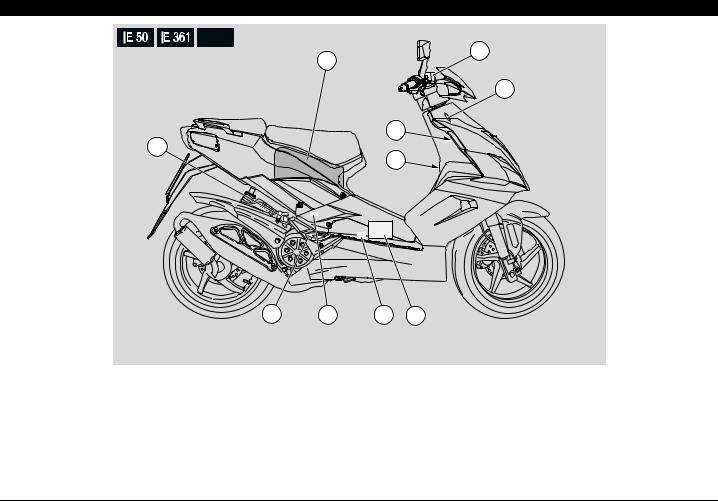
C 364
1 |
10 |
9 |
8 |
4 |
5 |
2 |
3 |
7 |
6 |
KEY |
|
|
|
|
|
1) |
Helmet compartment / glove |
5) |
Warning horn |
9) |
Right passenger footpeg |
|
compartment |
6) |
Battery |
10) |
Antitheft hook (for the aprilia "Body- |
2) |
Ignition switch/steering lock |
7) |
Fuse carrier |
|
Guard" shielded cable -) |
3) |
Bag hook |
8) |
Spark plug |
|
|
4) |
Front brake fluid reservoir |
|
|
|
|
use and maintenance SR 50 R 27

LOCATION OF INSTRUMENTS/CONTROLS |
|
|
C 364 |
|
|
3 |
4 |
5 |
1 |
|
6 |
2 |
9 |
8 |
7 |
KEY |
|
|
|
|
1) |
Rear brake lever |
5) |
Right rear-view mirror |
9) Ignition switch/steering lock ( - -+) |
2) |
Electrical controls on the left side of the |
6) |
Front brake lever |
|
|
handlebar |
7) |
Throttle grip |
|
3) |
Left rear-view mirror |
8) |
Electrical controls on the right side of |
|
4) |
Instruments and indicators |
|
the handlebar |
|
28 use and maintenance SR 50 R
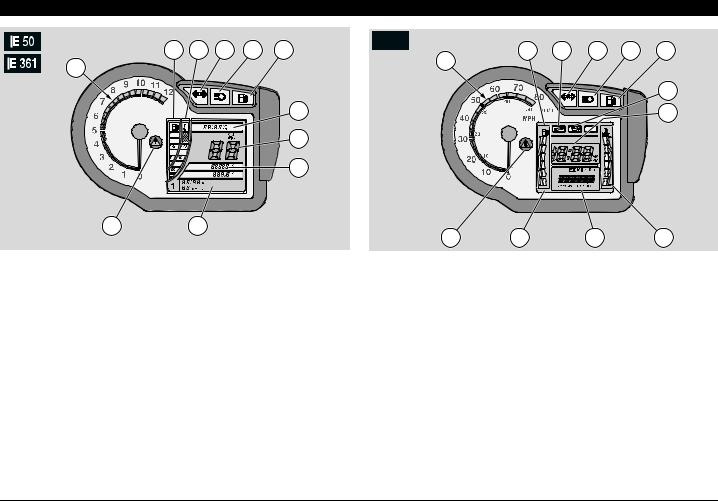
INSTRUMENTS AND INDICATORS
1 |
11 |
2 |
3 |
4 |
5 |
6 |
7 |
8 |
9 |
10 |
KEY
1)Rev counter
2)Fuel level indicator ( )
3)Coolant temperature indicator ( )
4)Green turn indicator warning light ( )
5)Blue high beam warning light ( )
6)Amber low fuel light ( )
7)Clock
8)Speedometer
9)Odometer
10)Multifunction indicator: odometer (ODO) / trip meter (TRIP) / battery voltage ( )
11)Red general warning light ( )
C 364
1 |
2 |
6 |
3 |
4 |
5 |
7 |
8 |
12 |
11 |
10 |
9 |
KEY
1)Speedometer
2)Fuel level indicator ( )
3)Green turn indicator warning light ( )
4)Blue high beam warning light ( )
5)Amber low fuel light ( )
6)Service warning
7)Mixer oil reserve light ( )
8)Digital clock
9)Coolant temperature indicator ( )
10)Multifunction indicator: odometer (ODO) / trip meter (TRIP) / battery voltage ( )
11)Red general warning light ( )
use and maintenance SR 50 29
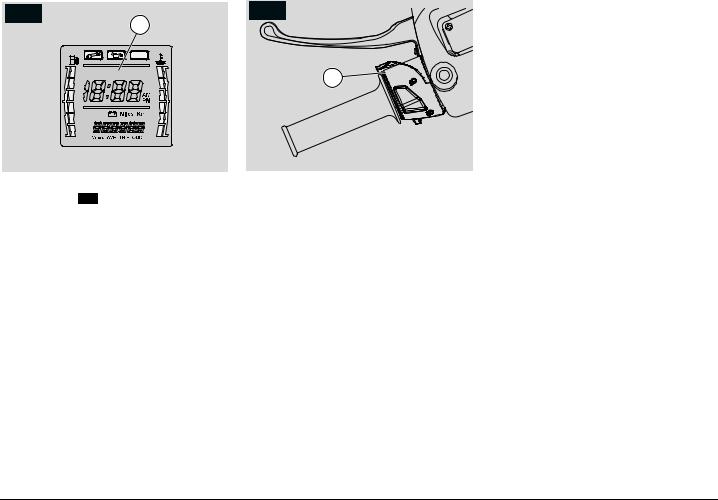
C 364
1
MULTIFUNCTION DIGITAL
COMPUTER C 364
Multifunction indicator functions
Use the Mode button (2), on handlebar left side, to select among various functions: clock setting, odometer (ODO), trip meter (TRIP), battery voltage value and trip meter reset.
Odometer (ODO)
When the instrument panel is switched on, the multifunction display (1) shows the odometer function (ODO).
C 364
1 |
MODE |
|
TRIP function (TRIP)
With the odometer display (ODO), press the Mode button (2) once to display the function (TRIP). Hold down the Mode button (2) for at least three seconds to reset stored trip value.
Battery voltage
With the odometer display, press the Mode button (2) twice to display the battery function.
Conversion of unit of measurement - Km/Mi
When battery voltage is displayed on multifunction display (1), hold down the Mode button (2) for more than ten seconds to change the unit of measurement from kilometres (Km) to miles (Mi). While pressing the button, the current unit of measurement is flashing. Should the button be pressed for less than ten seconds, the conversion will not take place.
Setting the clock
NOTE For safety reasons, it is possible to set this function when vehicle is stopped only.
Hold down the Mode button (2) for at least three seconds.
The column dividing hours and minutes will start flashing.
Set the hour value, it will increase by one unit every time you press the Mode button
(2).
Hold down the Mode button (2) again for at least three seconds to shift to minute setting. The indicated value will increase by one unit every time the Mode button (2) is pressed.
Hold down the Mode button (2) for at least three seconds to go back to hour setting.
If no key has been touched for three seconds, the display will automatically quit the clock setting function.
30 use and maintenance SR 50 R
